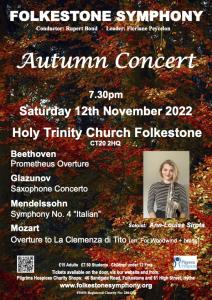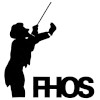Autumn Concert - Saturday, 12th November 2022

Beethoven - Prometheus Overture
Glazunov - Saxophone Concerto
- Soloist: Ann-Louise Sirota
Mozart - Overture to La Clemenza di Tito (arranged for Woodwind and Brass)
Mendelssohn - Symphony No. 4 "Italian"
Holy Trinity Church,
Sandgate Road,
Folkestone
CT20 2HQ

Review
Two overtures, a rarely-performed 20th century concerto and a much-loved symphony – this was a magnificent, varied and demanding programme to open the season of concerts by the Folkestone Symphony Orchestra conducted by Rupert Bond and led by local violinist Floriane Peycelon.
'The Creatures of Prometheus' was Beethoven's only ballet score, which, after some initial success after its 1801 premier at Vienna's Burgtheatre and later in New York, fell out of favour. Written to commission while he was working on the second symphony, the overture has a remarkable range of tonal colour and harmonic invention, hinting at the revolutionary style of the Eroica written two years later. The dramatic opening chords, innovatory at the time in their dissonance, were played with absolute precision – from the start it was clear that this is an orchestra which has fully mastered the technique of precise, disciplined ensemble playing. The opening adagio theme was rich in warm sonorities while the subsequent allegro was insistently energetic, with some expressive, delicate work by the strings, oboes and flutes. The orchestral climaxes were thrilling, though the enthusiasm of the wind and brass occasionally overwhelmed the strings. That said, there was an overall life-affirming energy to the performance and a delight in dramatic contrasts.
The wind and brass sections had their official moment of glory in Mozart’s overture to ‘La Clemenza di Tito’, a late work with magnificent music but somewhat static in performance. The arrangement of the work for wind and brass worked superbly, emphasising its grandeur and celebratory nature – the opera was written for the coronation of Leopold II of Bohemia. Indeed the tone of the opening fanfare continues through the piece. There was a subtle balance between the various groups of players which provided a variety of textures, not always easy to achieve with this instrumentation, and the underlying rhythmic themes came through crisply, without in any way being forced. As in other parts of the programme, the ensemble playing was excellent and the overall effect was invigorating and uplifting.
Stan Getz once said 'If you like an instrument that sings, play the saxophone. At its best it's like the human voice.' Not all musicians have agreed however, and it is largely through the efforts of the saxophonist Sigurd Rascher that the modern repertoire for the instrument developed beyond its use in Jazz. When Glazunov was living in Paris in the 1930s, Rascher badgered him to write something for the saxophone. The one-movement Concerto for Alto Sax and String Orchestra was in fact the last major work the composer produced and sadly, he probably never heard it performed. Its idiom is quite distinctive, an eclectic mix old and new – Russian nationalism, lush romanticism, conventional and innovatory harmonies, the music of post-First World War Paris and a tight, but novel, formal structure. As soloist Ann- Louise Sirota was, quite simply, superb. The piece is technically extremely demanding, but Ann-Louise took any difficulties in her stride. Her technique is phenomenal, particularly her ability to play the fastest runs and her breath control, but her performance was not simply a demonstration of bravura playing: she showed the full range of what a saxophone can do and got to the heart of the music. She produced a full, rounded, singing tone for the more romantic melodies, played runs with delicacy and fluidity, enjoyed the stridency of marcato passages and showed her own and her instrument’s prowess in an amazing cadenza. The strings of the orchestra provided just the right level of support, coping well with complex rhythmic and key changes (at one point having to play in C flat major) and at no time did they dominate the soloist. This was a remarkable musical experience and it is good that a local orchestra will take risks with its programming and include more unusual works.
Performing Mendelssohn’s Italian Symphony will, of course, delight an audience, but the danger in playing well-known works, is that any weaknesses will be quickly observed. This is even truer with Mendelssohn whose exquisite writing, like Mozart’s, requires absolute precision. Popular as the music may be, it is no push-over: one of the orchestra’s violinists repeated to me the line from ‘Amadeus’ that ‘there are too many notes.’ in the event, there was no need for any apprehension, and the orchestra produced a wonderfully vivid and energetic performance. Rupert Bond adopted a brisk pace in the opening movement, with some beautifully tuned string playing, clear woodwind and brass passages and great crescendos and climaxes. There was what I can only describe as a relaxed urgency to the opening theme of the second movement, with the melody underpinned by the rhythmic lower strings who maintained exactly the right tempo: it can be so easy to rush or drag this accompaniment. The major section was beautiful, played with balance and sensitivity. The classical and romantic elements of the third movement were reflected a measured way, without being overly dramatic, while the energy of the final movement was punctuated with some marvellous climaxes. All sections of the orchestra played with skill, cohesion and musicality, with some especially fine string passages and horn-playing.
Making the most of the sympathetic acoustic of the Victorian-Gothic church, Rupert Bond, with his clear beat and technical skill as a conductor, is to be congratulated on the discipline and precision within the orchestra, resulting in brilliant ensemble playing.
Not only was this an enjoyable concert, but it was highly professional: the large, local audience is fortunate that Folkestone can maintain such a fine group of players.
The orchestra has further concerts planned for 18th March 2023 and 24th June 2023. There is also a Family Christmas Concert at the church on 11th December introduced by Jan Leeming who has recently taken over as President of the orchestra.
Jonathan Watts
